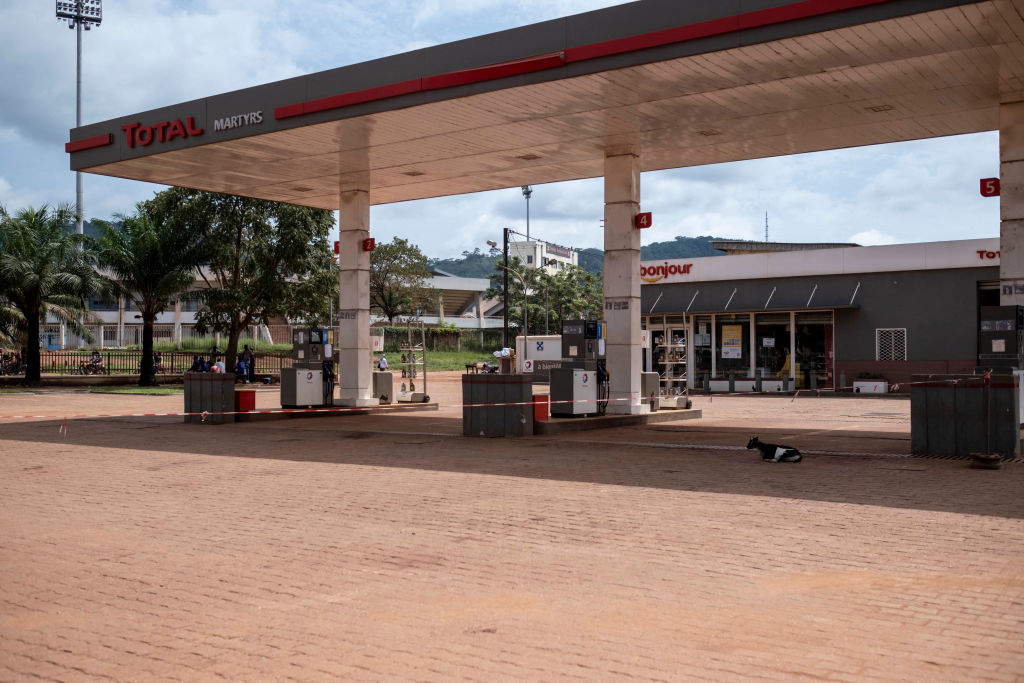Gas stations in the capital of the Central African Republic (CAR), Bangui, are a good indicator of a country in the grips of a fuel crisis. They frequently are empty or surrounded by long lines of vehicles and motorcycles waiting for a working pump.
Diodone Mangaï, a civil servant, arrived at a station one day at 8 a.m. to fill his tank but left empty-handed.
“They tell us it’s all gone, that we have to wait even longer,” he told Corbeau News Centrafrique. “I can’t go to work, and tonight I don’t know how I’m going to pick up my children from school. This shortage is killing us slowly.”
Fuel has become a weapon of war and a source of illicit wealth in the CAR, with Russia’s notorious Wagner Group mercenaries driving this new dynamic, according to a new report from the Global Initiative Against Transnational Organized Crime (GI-TOC).
“The Wagner Group … has built a parallel illicit fuel supply chain in the CAR to sustain deadly joint military operations with the Central African Armed Forces (FACA) and facilitate illegal mining,” said the November 6 report. “One of its front companies now serves as the army’s main fuel supplier, importing via Cameroon.”
Through research, investigative reporting and interviews, GI-TOC unraveled a group of Russian mercenaries, foreign nationals, complicit state officials and politically connected citizens that has consolidated control over the CAR’s formal fuel sector and operated in “a cartel-like manner.”
This network artificially maintains high fuel prices to maximize profit. GI-TOC calculated that for 2024, the group generated between $17.5 million and $30 million in “excess revenues that were divided through a well-organized pyramidal kickback scheme.”
Wagner fighters have acted as a personal security service for President Faustin-Archange Touadéra since 2018, effectively propping up his fragile government. The Russian mercenaries still run businesses and shell companies set up in the CAR by late Wagner founder Yevgeny Prigozhin. They make hundreds of millions of dollars from gold and diamond mining, weapons trafficking, illegal timber harvesting and other sources.
Wagner’s grip on fuel reflects a deepening institutional entrenchment in a country and government already rankled by accusations of state capture by Russian officials and operatives.
“Since late 2018, Wagner has established a robust transnational fuel network in the CAR, evolving from informal smuggling operations to a more structured system anchored in front companies, licensed marketers and government-granted exemptions,” GI-TOC stated.
The Central African people have grown angry about the fuel shortages, prices and distressing reports of diminishing government revenue.
“As the lines lengthen and engines remain idle, a demand emerges: transparency,” Corbeau News wrote in an April editorial. “Central Africans want to know where this fuel is going, who truly benefits from it, and why they continue to pay the heavy price of an endless crisis.”
GI-TOC urged the CAR government to investigate smuggling and illegal profiteering in the country’s fuel supply chain. It also called for an independent audit of the CAR’s fuel pricing structure in order to bring transparency and correct any policies that are inflating prices and losing public funds.
“Stabilizing the CAR’s volatile fuel sector and curbing criminal networks requires an urgent coordinated response by relevant national authorities with the full support of the presidency,” the report said. “International sanctions are warranted on fuel trade operators working directly or indirectly with sanctioned Russian entities, notably the Wagner Group and its successor, Africa Corps.”
| Tags |

